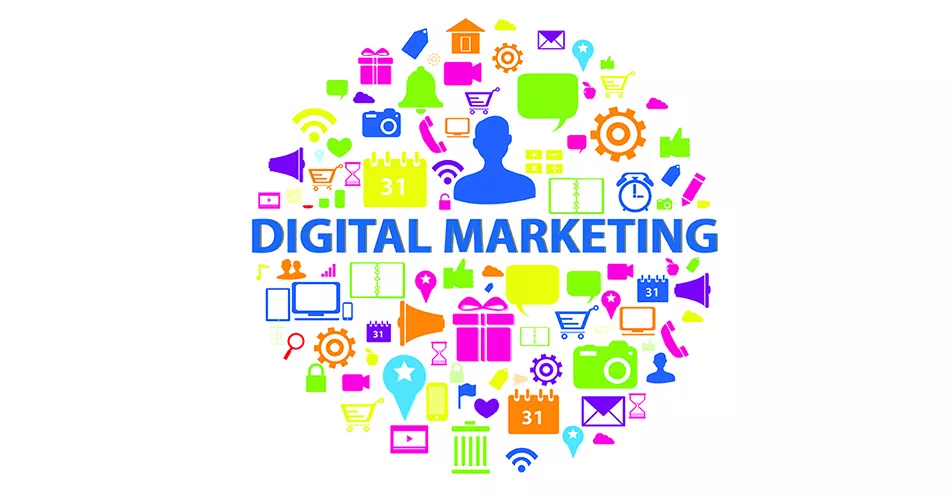What Is Digital Marketing?
Digital marketing refers to the strategic use of various online channels and platforms to promote products, services, or brands and engage with a targeted audience. It encompasses a wide range of activities, including search engine optimization (SEO), content marketing, social media marketing, email marketing, online advertising, and analytics.
Content Overview:-
- What Is Digital Marketing?
- Why is Digital Marketing Important? 💡
- Building a Digital Marketing Strategy 🎯
- Search Engine Optimization (SEO) 🔍
- Social Media Marketing 📱
- Email Marketing 📧
- Content Marketing 📚
- Pay-Per-Click (PPC) Advertising 💰
- Website Optimization and Conversion Rate Optimization (CRO) 🚀
- Data Analytics and Reporting 📊
- Digital Marketing Tools and Technologies 🛠️
- Emerging Trends in Digital Marketing 🌐
Why is Digital Marketing Important? 💡
Digital marketing is important for businesses for many reasons:
•It allows you to reach more customers. Over 4 billion people use the internet, so digital marketing gives you access to a huge audience.
•It’s cost-effective. Digital marketing channels are often more affordable than traditional marketing methods. Some are even free to use.
•It provides measurable results. Digital marketing campaigns can be tracked and analyzed to determine what’s working and not working. This allows for data-driven optimization.
•It enhances customer experience. By using digital channels, you can engage with customers where they spend their time and provide a seamless experience across devices.
•It keeps you competitive. Most consumers research products and services online before buying. Without a digital marketing strategy, you’ll get left behind by competitors.
•It drives higher conversion rates. Digital marketing, when done well, can lead to increased traffic, brand awareness, and ultimately, higher conversion rates.
Building a Digital Marketing Strategy 🎯
To create an effective digital marketing strategy, follow these steps:
1.Define your goals and objectives:
Determine what you want to achieve with your digital marketing efforts, such as increasing brand awareness, generating leads, or boosting sales.
2.Identify your target audience:
Understand who your ideal customers are and create buyer personas to guide your marketing efforts.
3.Conduct market research and competitor analysis:
Analyze your industry and competitors to identify opportunities and threats.
4.Develop a comprehensive digital marketing plan:
Outline the tactics and channels you’ll use to achieve your goals, and allocate resources accordingly.
Search Engine Optimization (SEO) 🔍
SEO is the process of optimizing your website to rank higher in search engine results pages (SERPs). This increases your visibility and drives organic traffic to your site. Key aspects of SEO include:
•Keyword research:
Identify relevant keywords that your target audience is searching for.
•On-page SEO:
Optimize your website’s content, meta tags, and URL structure to improve its visibility in search engines.
•Off-page SEO:
Build high-quality backlinks from other websites to increase your site’s authority and search engine rankings.
•Technical SEO:
Ensure your website is fast, mobile-friendly, and easy for search engines to crawl and index.
Social Media Marketing 📱

Social media marketing involves promoting your business on platforms like Facebook, Instagram, Twitter, and LinkedIn. To succeed in social media marketing:
•Choose the right platforms:
Focus on the platforms where your target audience is most active.
•Develop a content strategy: Plan and create engaging content that resonates with your audience.
•Build and engage your audience:
Interact with your followers, respond to comments, and encourage user-generated content.
•Utilize social media advertising:
Leverage paid advertising options to reach a larger audience and achieve specific objectives.
Email Marketing 📧
Email marketing is a powerful tool for building relationships with customers and driving sales. To get started with email marketing:
•Build an email subscriber list:
Collect email addresses from your website visitors, social media followers, and customers.
•Craft engaging email campaigns:
Create personalized, relevant, and valuable content that encourages subscribers to take action.
•Automate email workflows:
Set up automated email sequences to nurture leads and improve customer retention.
•Measure email marketing performance:
Track key metrics like open rates, click-through rates, and conversions to optimize your campaigns.
Content Marketing 📚
Content marketing involves creating and distributing valuable content to attract and retain customers. To excel in content marketing:
•Create high-quality content:
Produce content that is informative, engaging, and relevant to your target audience.
•Develop a content calendar:
Plan and schedule your content to ensure consistency and variety.
•Utilize different content formats:
Experiment with blogs, videos, infographics, podcasts, and more to cater to different audience preferences.
•Promote and amplify your content:
Share your content on social media, email, and other channels to increase its reach and visibility.
Pay-Per-Click (PPC) Advertising 💰
PPC advertising allows you to pay for ad placements on search engines, social media, and other websites. To succeed in PPC advertising:
•Understand the fundamentals:
Learn how PPC platforms like Google Ads and Facebook Ads work.
•Set up and optimize campaigns:
Create targeted ad campaigns and optimize them for maximum ROI.
•Conduct keyword research:
Identify relevant keywords to target in your ads.
•Measure and optimize performance:
Track key metrics like click-through rates, cost per click, and conversions to improve your campaigns.
Website Optimization and Conversion Rate Optimization (CRO) 🚀

Optimizing your website and improving conversion rates is crucial for digital marketing success. To achieve this:
•Optimize website design and user experience (UX):
Ensure your website is visually appealing, easy to navigate, and mobile-friendly.
•Conduct A/B testing and CRO:
Test different elements of your website to identify what works best for your audience.
•Implement landing page best practices:
Create effective landing pages that encourage visitors to take action.
•Analyze website performance metrics:
Monitor key metrics like bounce rate, time on site, and conversion rate to identify areas for improvement.
Data Analytics and Reporting 📊
Data-driven decision-making is essential for digital marketing success. To effectively analyze and report on your marketing efforts:
•Set up website analytics tools:
Use tools like Google Analytics to track user behavior on your website.
•Analyze key performance indicators (KPIs):
Monitor important metrics like traffic, engagement, and conversions to measure your success.
•Create meaningful reports and dashboards:
Visualize your data to identify trends and make informed decisions.
•Optimize your campaigns based on data:
Use your insights to improve your marketing efforts and achieve better results.
Digital Marketing Tools and Technologies 🛠️
Leverage essential digital marketing tools to streamline your efforts and improve your results. Some popular tools include:
Moz, Ahrefs, and SEMrush.
•Social media management platforms:
Hootsuite, Buffer, and Sprout Social.
•Email marketing software:
Mailchimp, Constant Contact, and Sendinblue.
•Marketing automation and CRM systems:
HubSpot, Salesforce, and Marketo.
•Data analysis and visualization tools:
Google Data Studio, Tableau, and Power BI.
Emerging Trends in Digital Marketing 🌐

Stay ahead of the curve by exploring the latest trends in digital marketing:
•Artificial intelligence:
AI-powered tools and chatbots are revolutionizing customer service and marketing automation.
•Voice search:
Optimize your content for voice search as more people use voice assistants like Siri and Alexa.
•Mobile marketing:
Ensure your website and marketing efforts are optimized for mobile devices, as more people access the internet on their smartphones.
•Personalization and customization:
Tailor your marketing messages to individual customers to improve engagement and conversions.
We hope this blog post provides a comprehensive overview of Basic concept of websites and hosting. If you have any questions or need further clarification on any of the topics discussed, please let us know, Our team of expert will get back to you. We are here to help our Reader!


